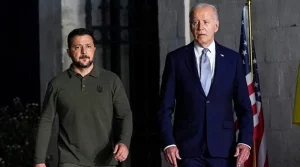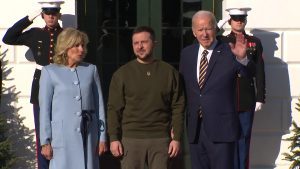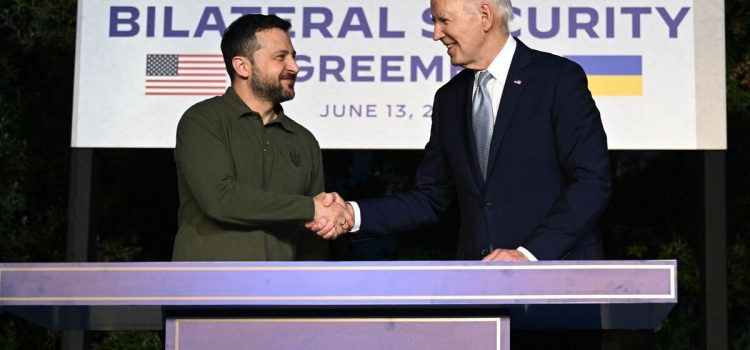
In a significant show of solidarity against Russian aggression, President Joe Biden and Ukrainian President Volodymyr Zelenskyy finalized a pivotal 10-year bilateral security agreement during the BARI international summit. The agreement, bolstered by a multibillion-dollar loan aimed at fortifying Ukraine’s defense capabilities, marks a robust response to Russia’s invasion that has persisted for over two years.
Agreement Details and Financial Commitments

At a joint news conference, President Biden emphasized the united front against what he termed “illegal aggression” by Russia. The bilateral security pact, coupled with a $50 billion loan supported by frozen Russian assets, underscores a resolute stance to support Ukraine’s military efforts, humanitarian needs, and post-conflict reconstruction.
Political Implications and U.S. Domestic Considerations
Despite the accord’s signing, its longevity could hinge on the outcome of the upcoming U.S. presidential election. Speculations suggest that a potential return of Donald Trump, known for his more conciliatory approach towards Russia during his tenure, might jeopardize continued U.S. support under the agreement. This uncertainty underscores the high-stakes political environment shaping international relations.
Retired Lt. Col. Alexander Vindman cautioned about potential volatility in U.S. foreign policy depending on electoral outcomes, highlighting a possible shift if a Democratic administration succeeds.
Path to NATO Membership and Strategic Alliances
President Zelenskyy characterized the security pact as a stepping stone towards eventual NATO membership, a longstanding strategic goal for Ukraine. However, Biden reiterated that Ukraine’s accession into NATO would not be imminent amidst ongoing conflict with Russia.
Economic and Diplomatic Strategies
The $50 billion loan, announced at the G7 summit, signifies a collective effort by advanced industrial democracies to alleviate Ukraine’s financial burdens in the face of prolonged conflict. The loan’s structure, secured by interest from frozen Russian assets, underscores a punitive economic strategy to compel Russia towards resolution.
International Diplomacy and Global Repercussions
Western allies, committed to isolating Russia through sanctions and diplomatic initiatives, seek to curtail external support to Russian forces. President Zelenskyy’s assertion regarding China’s non-participation in arms sales to Russia reflects broader efforts to limit international assistance to Russia’s military operations.
Biden’s International Engagement

President Biden’s participation at the BARI summit, encompassing discussions beyond Ukraine. But the global infrastructure and challenges posed by China’s economic policies, underscores a comprehensive approach to international diplomacy. His meetings, including a notable engagement with Pope Francis on artificial intelligence risks, highlight a broad diplomatic agenda amidst personal and political challenges back in the United States.
Conclusion
As President Biden’s visit to Italy concludes, the signed security agreement. Between the U.S. and Ukraine stands as a pivotal commitment amidst ongoing geopolitical tensions. But the agreement’s future remains intertwined with global political dynamics, underscoring the critical role. And the international cooperation in addressing regional conflicts and safeguarding global stability.










